Backstage in January
devoted to our environment, our planet, to us ... Art is always also political
This month I am listening to …
Caroline Shaw’s four-movement string quartet The Evergreen - moss, stem, water, root - is a tribute to a tree’s ecosystem, and beautifully descriptive.
I am reading …
through the Alternative Classical bookshop list of books with a classical music theme. A great idea which not only supports the writers and Alternative Classical but also independent bookshops around the country. I definitely have some books to add.
I am looking at …
the new Casals Forum in Kronberg (my home town)
In the words of the Kronberg Academy:
“... Music in the service of humanity” – that philosophy of Pablo Casals, the great cellist and champion of peace who believed that art, humanity and respect for nature are inextricably linked – will become the guiding principle for all training and musical activities that take place at the new Casals Forum, which is the first concert hall and study centre in Europe capable of carbon neutral operation.”
The Casals Forum is cooled using an innovative ice storage tank funded by the EU and the State of Hesse, making it (to the best of their knowledge) the first carbon-neutral concert hall.
The intimate concert hall can host up to 550 guests on two levels. The acoustic can be adjusted depending on the size of ensemble (up to 65 musicians can fit on stage). There is also a smaller venue for up to 150 guests. Part of the hall offers views towards the park and the Taunus hills, still quite unusual for a concert hall, but adds to the transparency and the inviting atmosphere the Academy no doubt wants to achieve. The courtyard and restaurant will probably help, too.
The hall and the adjoining hotel are also right next to the train station with direct links to Frankfurt Main station as well as in walking distant to the centre of town and the local park. So basically not even an environmentally friendly bike is required.
I was there over Christmas and did not manage to have a look inside (the team was on well deserved vacation) but very much looking forward to experiencing a concert there someday soon. Maybe even together with some UK musician!!
I am thinking about …
the environmental consequences of the classical music industry’s activities. There is much to do and my thoughts and observations will obviously only scratch the surface today. The work is ongoing, whether it is the sustainability of an opera production or looking closely at the environmental impact of a young string quartet’s way of touring.
“The indicative total shows that the UK music market is responsible for approximately 540,000 tonnes CO2e per annum. While this is not as carbon intensive as many other industries, it remains a significant challenge to reduce CO2e emissions by 80% by 2050 in line with national and international targets.”1
Touring, especially by plane, is the most significant contributor to greenhouse gas emission in the sector. A short haul flight for an ensemble orchestra of twenty-odd players has a shocking impact – over 10 metric tonnes of CO2e – when estimated using recommended government conversions.
However travelling by train will mean a far less convenient and often a much more expensive trip.2 For artists and ensembles in the middle to low income bracket especially (and let’s face it, there are many here in the Uk, as fees are so very low), more days on the road also mean loss of earnings elsewhere (gigs, teaching etc). Extra childcare costs must also be considered. And although train travel is a lottery in the UK, you might also get stuck on your international rail travel (I am looking at you Deutsche Bahn!).
How about renting electric cars or buses? Rental prices are varying extremely and of course energy prices at the moment are not helping. The range of a 50 seater bus is ca 200 miles with a 2 hour charging time to full capacity again. Time and cost are clearly still quite prohibitive.
Maybe the promoter or organiser might like to chip in to add to their green credentials? For musicians it is worth considering to collaborate with event organisers to make more conscious decisions about the gigs and the festivals they perform at. Choosing to play primarily at events that prioritise sustainability, artists can send a clear message while putting pressure on event organisers to meet expected environmental standards. However this is probably possible for a band like Coldplay, but I have yet to meet more than one to two classical musician with that kind of power. We might all have to shout even louder.
One step in the right direction is to find and utilise synergies between artist agencies, festivals, concert venues, concert series, on a national and international scale. The bigger the art agencies and venues, the better they are connected and can plan an environmentally viable tour, often years in advance. However, younger ensembles are less able to do that and mostly accept and travel to where they are invited to perform, criss-crossing the continent.
So, should we skip touring abroad? But where would we be without cultural exchange? Maybe we could meet in the metaverse? While this might represent a novel solution to minimise emissions, it will not really replace live concerts and the joy of exchange in the real world. A hybrid model whereby artists perform both virtual and live concerts to minimise the impact of live touring emissions sound attractive. The one good thing about the pandemic is that we all got so much more tech savvy. We have nearly all broadcasted from our bedroom or later from still empty venues and most of us embraced the possibilities to reach out that way to new and far away audiences. Many organisations now permanently add online concerts to their programming. It does also give the audience a choice to attend in person or minimise travel.
For small music organisations or ensembles on a budget it’s all about baby steps, depending on financial circumstances. Having shifted through many initiatives, declarations and tool kits, so far I am impressed with culture declares and music declares; very clear and informative with ideas and steps that are manageable to implement for smaller set ups.
By making some informed choices, artists are able to reduce their carbon footprint, and a lot of project managers and artistic directors have added ‘Transformation Manager’ to their many hats with the job description reading something like:
dynamic and proactive individual with some experience of change and transformation, and a very general knowledge (but constantly researching the - often confusing - data available) of Climate Change issues and the work needed to achieve carbon reduction and a sustainable working environment.
And I like …
this text score by composer Annea Lockwood from 2018
Listening with the neighborhood at midnight, or at dawn.
Listening with an awareness that all around you are other life-forms simultaneously listening and sensing with you – plant roots, owls, centipedes, cicadas – mutually intertwined within the web of vibrations which animate and surround our planet.
Listening to feel that ‘I am one with all these phenomena. Can I know?’ I listen to know it.
What we are at one with, we cannot harm.
Such a relevant and truly poetic score, easily to be ‘performed’ by all.
On a side note: I love the idea that with a text score a composer can open up their ideas/art/work to performers who might never had a conventional musical training or knowledge. No conventional instrumental or vocal content might be needed. It can be as poetic, or abstract as you like, with lines diluted.
Thanks for reading,
Kirsten
PS There is a lot of reading, listening, research and travel involved in my line of work; I stumble across many interesting things and ideas I can't just leave behind so I decided to write about them and share with you.
https://juliesbicycle.com/resource/uk-music-greenhouse-gas-emissions/
I love it though, that new over-night train links have been (re-)introduced on the continent. Tempting. Check them out.







